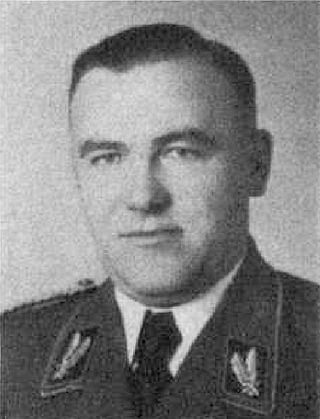
The Reichskommissariat Ostland (RKO) was established by Nazi Germany in 1941 during World War II. It became the civilian occupation regime in Estonia,Latvia,Lithuania,and the western part of Byelorussian SSR. German planning documents initially referred to an equivalent Reichskommissariat Baltenland. The political organization for this territory –after an initial period of military administration before its establishment –involved a German civilian administration,nominally under the authority of the Reich Ministry for the Occupied Eastern Territories led by Nazi ideologist Alfred Rosenberg,but actually controlled by the Nazi official Hinrich Lohse,its appointed Reichskommissar.

Erich Koch was a Gauleiter of the Nazi Party (NSDAP) in East Prussia from 1 October 1928 until 1945. Between 1941 and 1945 he was Chief of Civil Administration of Bezirk Bialystok. During this period,he was also the Reichskommissar in Reichskommissariat Ukraine from September 1941 until August 1944 and in Reichskommissariat Ostland from September 1944. After the Second World War,Koch stood trial in Poland and was convicted in 1959 of war crimes and sentenced to death. The sentence was later commuted to life in prison and Koch died of natural causes in his cell at the Barczewo prison on 12 November 1986.

During World War II,Reichskommissariat Ukraine was the civilian occupation regime of much of Nazi German-occupied Ukraine. It was governed by the Reich Ministry for the Occupied Eastern Territories headed by Alfred Rosenberg. Between September 1941 and August 1944,the Reichskommissariat was administered by Erich Koch as the Reichskommissar. The administration's tasks included the pacification of the region and the exploitation,for German benefit,of its resources and people. Adolf Hitler issued a Führer Decree defining the administration of the newly occupied Eastern territories on 17 July 1941.

Reichskommissariat Moskowien was the civilian occupation-regime that Nazi Germany intended to establish in central and northern European Russia during World War II,one of several similar Reichskommissariate. It was also known initially as the Reichskommissariat Russland. Siegfried Kasche was the projected Reichskomissar,but due to the Wehrmacht's failure to occupy the territories intended to form the Reichskommissariat,it remained on paper only.

Hinrich Lohse was a Nazi German politician and a convicted war criminal,best known for his rule of the Reichskommissariat Ostland,during World War II. Reichskommissariat Ostland now comprises Lithuania,Latvia,Estonia,and parts of modern day Belarus.

August Eigruber was an Austrian-born Nazi Gauleiter and Reichsstatthalter of Reichsgau Oberdonau and Landeshauptmann of Upper Austria. He was convicted of war crimes at Mauthausen-Gusen concentration camp and hanged.

Karl Rudolf Werner Braune was a German SS functionary during the Nazi era and a Holocaust perpetrator. During the German invasion of the Soviet Union of 1941,Braune was the commander of Einsatzkommando 11b,part of Einsatzgruppe D. Braune organized and conducted mass murders of Jews in the Army Group South Rear Area,the Reichskommissariat Ukraine. For his role in these crimes,Braune was tried before an American military court in 1948 in the Einsatzgruppen trial. He was convicted,sentenced to death and executed in 1951.

Paul Wegener was a German Nazi Party official and politician who served as the Gauleiter of Gau Weser-Ems as well as the Reichsstatthalter of both Bremen and the Free State of Oldenburg.

Carl Georg Röver was a German Nazi Party official. His main posts were as Gauleiter of Gau Weser-Ems and Reichsstatthalter of both Oldenburg and Bremen.
Emil Stürtz was a German Nazi Party official and politician who served as the Gauleiter in Brandenburg from 1936 to 1945.
Erich Maschke was a Nazi and a German historian and history professor. He taught most recently at the Ruprecht-Karls-University in Heidelberg. During the Nazi era he promoted racist and nationalist ideology. After the war he led the so-called Maschke Committee,commissioned by the West German parliament,which investigated the treatment of German prisoners-of-war during and after World War II by the Allies.
Erich Akt was a German politician in the Nazi party during and before the years of World War II. From 1938 to 1945 he was a member of the Reichstag.
Waldemar Wappenhans was an SS-Gruppenführer and Generalleutnant of police who served as an SS and police leader (SSPF) in the Reichskommissariat Ukraine.

Hans Haltermann was a German engineer,Nazi Party politician and SS officer. As an SS-Gruppenführer and Generalleutnant of Police,he served as an SS and Police Leader in occupied Ukraine and Byelorussia.
Heinz Roch was a German Nazi Party politician,SS-Oberführer and SS and Police Leader (SSPF) in the Crimea,the Bialystok District and northern Norway during the Second World War. He committed suicide at the end of the war.
Fritz Tittmann was a German Nazi politician and SS-Brigadeführer who served as an early Party leader in Saxony and,from 1941 to 1942,as SS and Police Leader in Nikolajew. He died near the end of the Second World War in unclear circumstances.

Walther Schröder was a German Nazi Party politician,SS-Brigadeführer and Police President of Lübeck,who served as an SS and Police Leader in Latvia and Estonia during the Second World War.

Lucian Wysocki was a German Nazi Party politician,Police President and member of both the SA and the SS. As an SS-Brigadefuhrer and Generalmajor of police,he served as the SS and Police Leader of Generalbezirk Litauen during the Second World War.
Werner Fromm was a German SS-Oberführer and Oberst of police. During the Second World War he served as the SS and Police Leader (SSPF) in the Bialystok District,and subsequently as the police commander in Sarajevo. He also fought as an officer in the Waffen-SS.










